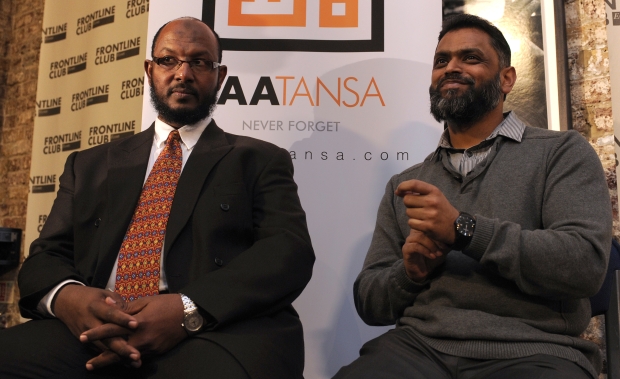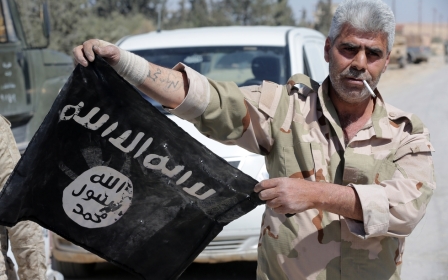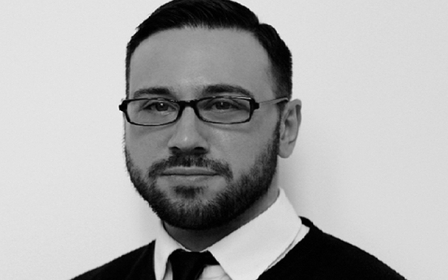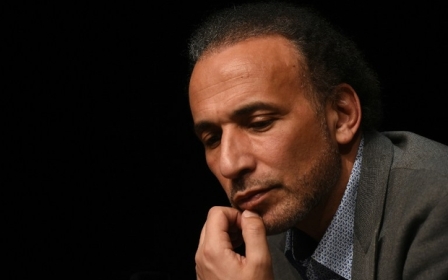Moazzam Begg: Muslims need a 'central authority' to unite under Islam
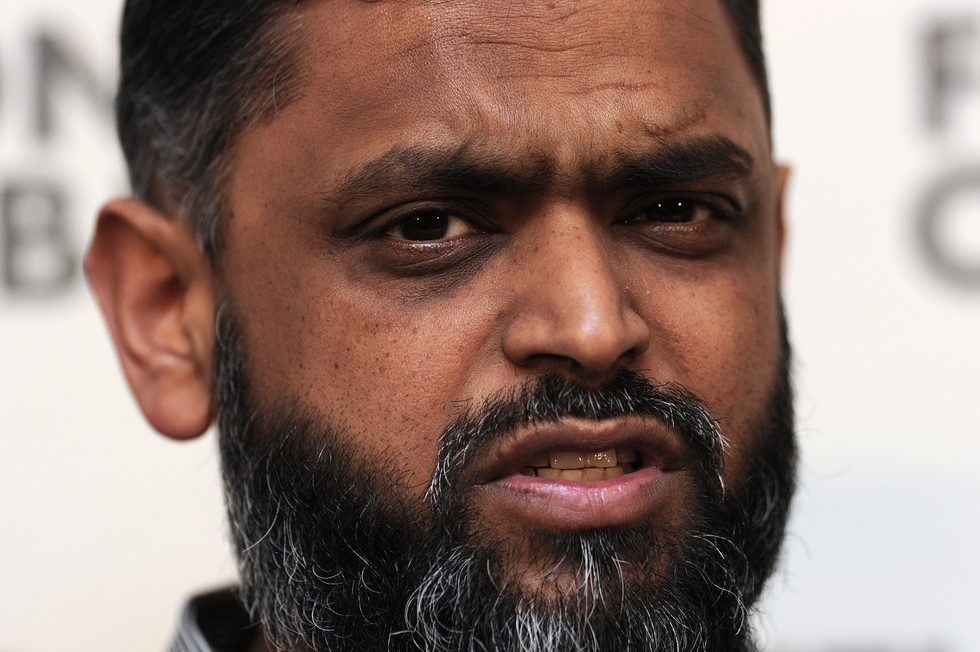
When Moazzam Begg was released from prison by the Americans in 2005, he would have been forgiven for retreating to a quiet life in Birmingham with his wife and four children, after having suffered nearly three years of extrajudicial imprisonment in two of the world’s most notorious jails: Guantanamo Bay in Cuba and the Bagram Theatre Internment Facility in Afghanistan.
But far from avoiding the limelight, over the proceeding decade Begg has built a reputation as one of Britain’s leading activists campaigning both against the "war on terror" and the controversial British counter-terrorism policy Prevent, which he and many others have decried for unfairly targeting Muslims.
Now, amid increasing calls for Islam to be reformed, Begg spoke to Middle East Eye on how his religion is being practised, and what he believes should be done to combat the appeal of groups including the Islamic State (IS).
He immediately addressed the idea of a potential Islamic reformation, and said that he agreed change is required, but not from within Islam: it should come instead from people – both Muslim and non-Muslim.
“Islam as a code of practice, as a way of life, as a religion, is constantly adapting to its own environment in various countries. So, it doesn’t need a reformation," said Begg. "I believe we as human beings... and Muslims... need reformation."
Begg, 48, spoke with the slow and deliberate intensity of a man who has had time to contemplate in prison what many in the outside world have no time for.
His views have undoubtedly been shaped by his experiences in prison, which came after he was arrested in Pakistan in early 2002 and was subsequently accused of being a member of and recruiter for al-Qaeda - accusations he has always denied.
When discussing the idea of an Islamic reformation, Begg said that calls for such a movement have tended to emanate from countries “that are tacitly or directly supporting wars of aggression” in places with Muslim-majority populations.
“You can’t on the one hand say that we want to bring about democracy, freedom, and human rights and then at the same time say that while we are invading and occupying these countries the problem is Islam,” he said.
“The truth is that Islam does need a unifying factor – one central authority where the Muslim bodies can turn to and say 'from here we get our Islamic decisions'.”
He explained that the lack of a focused leadership structure in Islam means that groups including IS can attempt to achieve their political goals by turning to the religion for a source of legitimacy.
“IS claims to have established a forum in which you have the leader all Muslims should turn to,” he said. “But the majority of Muslims have rejected that because of the barbarity of IS and its denunciation by all the scholars.”
'Muslims need to unite'
Though IS has been rejected by scholars and community leaders, the problem remains, at least for Begg, that Muslims are lacking unity. This, he said, means the practice of Islam cannot be regulated in a way that is centralised, and instructed by scholars who understand the religion’s rich and diverse schools of thought.
“Islam is a moral code and a legal system which requires deep scholarly interpretation reflecting on a tradition going back hundreds of years,” he said. “When people call for reform they must be extremely well-versed in the various strains of thought that exist within Islam.
“If somebody wants to talk about the English legal system but doesn’t care about what the most respected judges and the greatest barristers say then they wouldn’t be listened to. It’s the same when it comes to Islam.”
When discussing what a unified Muslim forum could be, Begg was careful not to use any religious words, many of which have taken on broadly frightening connotations for the public, such as caliphate, which is used to describe a transnational Islamic government.
Begg instead spoke in terms that are potentially far more appealing – and certainly more digestible – for those who derive their understanding of Muslims and Islam from what he described as “right-wing tabloids”.
“It is very important to have the unity of bringing Muslim lands together similar to the European Union, where you have one central authority,” he said.
The caution with which Begg spoke is reflective of a person who has been the target of countless media reports accusing him of being an extremist.
The latest attack against Begg, which targeted him and the advocacy group CAGE, where he is outreach director, was in the Daily Mail on 8 January.
It featured a large front page photograph of Begg speaking at a university with the headline "Fanatics’ Campaign of Hate on Campus".
The newspaper claimed that Begg was touring universities and “poisoning the minds” of students by criticising the Prevent counter-terrorism policy.
Begg said the story “hurt” him and his family. He said that he is not an extremist, arguing that his beliefs are “very much among the mainstream” of those held by British Muslims.
He said that he was aware his call for Muslim-majority countries to be brought together in an EU-style unification model is an opinion that may see him again labelled as an extremist.
Being labelled an extremist is normal, Begg said, as he is someone who “challenges the status quo” by being a vocal critic of Britain’s foreign policy, which he said he sees as being a key driver for Muslims to join IS and carry out violent attacks.
He described the question over whether foreign policy or religious ideology is to blame as toxic, with opposing sides “constantly at loggerheads,” but was surprisingly conciliatory in his analysis of the problem.
“The truth is that there is a mix [of factors],” he said. “Of course Islam is used as a method to cement people’s beliefs – everybody will try to legitimise their views using some form of ideology.
"It doesn’t make sense for a group to come along and say 'you must do this because we say so' – they have to use some kind of belief system.
“And Islam is extremely powerful and potent in that part of the world [the Middle East].”
The British Prime Minister, David Cameron, has been among numerous global leaders who have sought to distance IS from Islam, going so far as to call on the BBC to stop calling them Islamic State, and instead use a word derived from Arabic, Daesh.
However, Begg said he disagreed with such an approach and added that there was little point in saying IS members were not Muslims.
“Of course they are from the Islamic world – they are not Jews, Hindus, Sikhs or Buddhists. They are Muslims,” he said.
“They are from the Islamic tradition but they are also people that the Islamic tradition has seen in the past, recognised, and described in terms of being secessionists who have left the main body of Muslim thought.
“It’s not helpful to say they are not Muslims, because David Cameron cannot pronounce takfir on Muslims – he’s not an Islamic scholar able to do so,” he said, referring to the term used to describe the act of declaring that somebody is not a Muslim.
Begg said he believes that the increased focus on Islam has led to people holding strong opinions about a religion that they know little about.
Begg said he did not understand why there had been calls for Islam to be changed because of controversies surrounding the killing of apostates, or the stoning to death of adulterers.
'Stoning a matter for the scholars'
Asked by MEE whether he would condemn stoning, Begg said it was a matter of “deep doctrinal law”.
“In terms of Islamic punishment systems it requires a discussion by people who are extremely well-versed in the doctrines of Islamic law.”
Begg maintained his always friendly and polite manner, and explained his answer in the context of a recent university event where he had spoken about Prevent.
He said that after having spoken for 90 minutes about how Prevent has affected Muslims in Britain, the first question he was asked by an audience member was whether he would condemn stoning.
“Why do you think I should be qualified to answer this question?” he said he answered.
When pressed again on the subject, Begg questioned why Muslims were being asked this question in the first place.
“Why are we being asked to condemn something that doesn’t happen and when it does happen it’s carried out by people who we have no say over,” he answered, responding to a question about stonings taking place in Pakistan, which he said have never been state sanctioned.
“During the entire period of the Ottomans (from 1299 until 1922) never was a man or woman stoned for adultery because the evidential proof requires four witnesses to the act and it is simply impossible to prove.
“Stoning existed way before Islam did. Islam introduced evidential requirements that did away with it in real terms. If you say to someone ‘you must condemn it’ then what you’re telling them is that they must condemn their belief. And no Muslim will do that.”
He said such debate was part of an “onslaught” against British Muslims, which he explained ultimately came back to the Prevent policy.
'Time to scrap Prevent'
Prevent has come under increasing criticism in recent months, as stories have emerged of teachers referring pupils to a deradicalisation programme for reasons including pro-Palestine activism, as well as the bizarre story of a toddler who was referred for mispronouncing “cucumber” so it sounded like “cooker-bomb”.
Advocates for Prevent have sought to explain away such incidents as anomalies that require greater engagement from British Muslims so that the policy can be more effective and achieve its goals.
Begg rejected this argument and insisted that Muslims have in fact been engaging with Prevent.
“The engagement process means that we’ve been pointing out what’s wrong with it and how it has impacted ordinary people,” he said.
He added that “most right-minded people don’t agree with Prevent,” referencing a recent declaration by the National Union of Teachers that called for the policy to be scrapped, which came on top of other criticism from senior figures including Labour MP Keith Vaz, who has also said it should be abolished.
Begg said that the solutions to problems raised by IS and the wider problem of radicalisation lie in looking at other conflicts where peace agreements have been struck and maintained, in particular in Northern Ireland.
The 1998 Good Friday agreement largely brought an end to decades-long violence and led to the establishment of a power-sharing government in Northern Ireland.
“Britain dealt with a situation that caused far more deaths [than attacks by Muslims] – 3,000 people were killed in the Northern Ireland Troubles – and still they came to an agreement with the IRA.
“It might not be palatable, but if you want real solutions you need to speak to the people you’ve been demonising.”
Begg repeated his assertion that the fate of British and American hostages killed by IS could have been different had both countries negotiated their release.
“The Turks, French, Italians, and others have all had their hostages released,” he said. “That means some process took place. That means something happened where people were talking to one another.
“I know IS is much harder to deal with than anyone else, but where there’s a will there’s a way.”
He said bombing campaigns were just “more of the same,” and had over the past 15 years directly contributed to al-Qaeda growing from a nebulous group in 2001 to one with franchises “all over the world”.
“That eventually gave us IS, which makes al-Qaeda look relatively tame,” he said. “More of the same cannot be the answer. We need more negotiations with people that you don’t like.”
And in terms of a broader domestic solution to Muslims joining such groups, Begg urged the government to start listening to their stories and engaging with their grievances.
“If young kids are saying that we are going to off to become terrorists because of how we are being treated, then you have to listen to what the kids are saying,” he said. “Because there’s no point in saying they are doing it because their Islamic belief tells them to do so.”
Begg said the government would be wise to speak to groups including CAGE, but rather than seeking to promote his own organisation he seemed genuinely concerned with finding a solution to a problem he believes has been made worse by British policies.
“It doesn’t have to be CAGE but certainly groups like ours. I say this because we deal with a large number of people who have been directly impacted by anti-terror legislation.”
New MEE newsletter: Jerusalem Dispatch
Sign up to get the latest insights and analysis on Israel-Palestine, alongside Turkey Unpacked and other MEE newsletters
Middle East Eye delivers independent and unrivalled coverage and analysis of the Middle East, North Africa and beyond. To learn more about republishing this content and the associated fees, please fill out this form. More about MEE can be found here.


